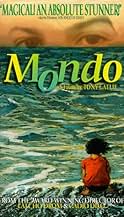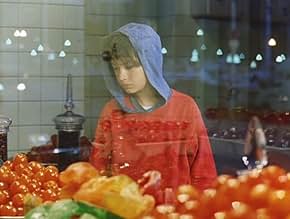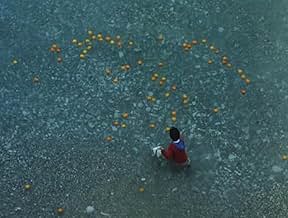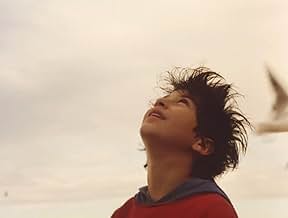Aggiungi una trama nella tua linguaMondo is a homeless young boy, with a big smile, who wanders around Nice looking for food and a place to sleep.Mondo is a homeless young boy, with a big smile, who wanders around Nice looking for food and a place to sleep.Mondo is a homeless young boy, with a big smile, who wanders around Nice looking for food and a place to sleep.
- Regia
- Sceneggiatura
- Star
- Premi
- 1 vittoria in totale
Recensioni in evidenza
Mondo begins like a quiet, almost whimsical tale of a mysterious boy drifting through the streets of Nice. With minimal dialogue and an observational style, it may seem droll at first, but stick with it, focus, and don't try to decode the storyline... You won't figure it out.
As the story unfolds, a subtle twist emerges that forces you to reconsider everything you've just seen. The film's strength lies in its quiet depth and the emotional weight it reveals in hindsight. A second viewing brings out hidden layers and powerful "a-ha" moments. Thoughtful, well-acted, and deeply affecting-a quietly profound experience.
As the story unfolds, a subtle twist emerges that forces you to reconsider everything you've just seen. The film's strength lies in its quiet depth and the emotional weight it reveals in hindsight. A second viewing brings out hidden layers and powerful "a-ha" moments. Thoughtful, well-acted, and deeply affecting-a quietly profound experience.
This film is a must-see, like Gatlif's Latcho Drom. It is poetic, cinematically poetic. There are several moments that brought me to tears, out of the sheer beauty of the human emotion expressed in acting and photography. "Acting" does not sound right - you have the impression you are watching real people living out love in their actual souls.
I can't review Tony Gatlif's films without some bias. I was absolutely blown away by Swing. Mondo is, actually, a different world. Of hues, colours, dreams and a very powerful story. Maybe one with which I feel deeply related to.
Mondo could be an angel fallen form heaven. His relationship with Nature and all of its signs and sounds is as if he's part of a different world than any populous city. There's no way to know where he comes from. He could be a Gypsy, but he's not. He could be a homeless boy. But, alas, he's not. The story told by Gatlif here is one of redemption from this world. We pretty easily outgrow any capacity left in us to wonder, to imagine, to admire the world as it is. We, as denizens of any big and dehumanised society, become simple followers of a fate that is not devised by our own means, it is a fact of life. A mere realisation that we are in a merry-go-round that eventually will stop. In the meanwhile, we'd just cling on to it and, one day, let go.
Immersed in a world of haste and worries where a simple smile could move our lives into a deep understanding of ourselves, we choose not to. We choose to live it as it comes, no questions asked. And emptiness fill our souls, our hearts, our feelings, that are reduced to shyness, to duress or insensibility.
Mondo creates joy around him, because of his smile, his ways, his angelic power to touch souls and make them see the light. Mondo is not human. He even may not be real at all. But Mondo is here to remind us of the many missing things that make our lives, sometimes, empty, inconsistent and superficial.
Tony Gatlif is a master working with children. His Gypsy friends and actors are truthful to his otherworldliness. Mondo is the boy we all need to be reminded that growing up doesn't mean being stupid. And he's the soul to many. He reaches within and without whoever he touches with his smile.
Nice is portrayed as the soul-splitting cacophony of modern life, where Mondo always finds a way to connect with what matters for the soul. His life, a metaphor of a stray dog's, is transformed many times in front of our eyes in the life of a dog.
The execution of this film is flawless. The music is, as it always is with Gatlif's films, superb. Acting is magnificent, and Mondo is one of those roles played by non-actors that will be remembered for a long time.
By the way: someone pointed out that the nude scene of Mondo is out of place. If you watch the film and feel uncomfortable by this, you may not be normal: that is as significant as the other tens of clues Gatlif gives us to understand what he's trying to convey with the story.
A ten out of ten. Hey!, and don't miss Swing, another beautiful story.
Mondo could be an angel fallen form heaven. His relationship with Nature and all of its signs and sounds is as if he's part of a different world than any populous city. There's no way to know where he comes from. He could be a Gypsy, but he's not. He could be a homeless boy. But, alas, he's not. The story told by Gatlif here is one of redemption from this world. We pretty easily outgrow any capacity left in us to wonder, to imagine, to admire the world as it is. We, as denizens of any big and dehumanised society, become simple followers of a fate that is not devised by our own means, it is a fact of life. A mere realisation that we are in a merry-go-round that eventually will stop. In the meanwhile, we'd just cling on to it and, one day, let go.
Immersed in a world of haste and worries where a simple smile could move our lives into a deep understanding of ourselves, we choose not to. We choose to live it as it comes, no questions asked. And emptiness fill our souls, our hearts, our feelings, that are reduced to shyness, to duress or insensibility.
Mondo creates joy around him, because of his smile, his ways, his angelic power to touch souls and make them see the light. Mondo is not human. He even may not be real at all. But Mondo is here to remind us of the many missing things that make our lives, sometimes, empty, inconsistent and superficial.
Tony Gatlif is a master working with children. His Gypsy friends and actors are truthful to his otherworldliness. Mondo is the boy we all need to be reminded that growing up doesn't mean being stupid. And he's the soul to many. He reaches within and without whoever he touches with his smile.
Nice is portrayed as the soul-splitting cacophony of modern life, where Mondo always finds a way to connect with what matters for the soul. His life, a metaphor of a stray dog's, is transformed many times in front of our eyes in the life of a dog.
The execution of this film is flawless. The music is, as it always is with Gatlif's films, superb. Acting is magnificent, and Mondo is one of those roles played by non-actors that will be remembered for a long time.
By the way: someone pointed out that the nude scene of Mondo is out of place. If you watch the film and feel uncomfortable by this, you may not be normal: that is as significant as the other tens of clues Gatlif gives us to understand what he's trying to convey with the story.
A ten out of ten. Hey!, and don't miss Swing, another beautiful story.
10Anglik
Throughout this movie experience - which moved me to tears several times - I had an extraordinary feeling that I was watching an adaptation of "Le Petit Prince" ("The Little Prince") by Antoine de Saint-Exupéry. Even though the film is set in a different time and place, and its main characters and plot line are not really in sync with the story of a boy from another world, there is, at the same time, a strange affinity here with de Saint-Exupéry's timeless classic. As we watch the peculiar odyssey of a little Mondo - a boy with no home, no family, no past, no memory almost, and no real skill apart from smiling wide joyful grins and opening his heart to strangers - we have no other choice but to fall in love with this little homeless adventurer, this modern Gavroche, who seems almost mythical in the way he turns up in the midst of people's lives to touch them, move them, perhaps change them - for a couple of days, or forever.
Heartily recommended to all those who embrace cinema as a way of channeling emotions, rather than notions and philosophical ideas, through images. "Toujours beaucoup".
Heartily recommended to all those who embrace cinema as a way of channeling emotions, rather than notions and philosophical ideas, through images. "Toujours beaucoup".
Ovidiu Balan, playing a homeless Gypsy boy, made this movie worth seeing. The movie, in itself, is visually stunning. More of a video documentary than anything, it has very little dialogue....and maybe that's a good thing. Words get in the way sometimes.
From what I have heard, Ovidiu Balan is not French and was deported after the making of the movie.
From what I have heard, Ovidiu Balan is not French and was deported after the making of the movie.
I più visti
Accedi per valutare e creare un elenco di titoli salvati per ottenere consigli personalizzati
Dettagli
- Data di uscita
- Paese di origine
- Sito ufficiale
- Lingua
- Celebre anche come
- モンド
- Luoghi delle riprese
- Aziende produttrici
- Vedi altri crediti dell’azienda su IMDbPro
- Tempo di esecuzione
- 1h 20min(80 min)
- Colore
Contribuisci a questa pagina
Suggerisci una modifica o aggiungi i contenuti mancanti

















